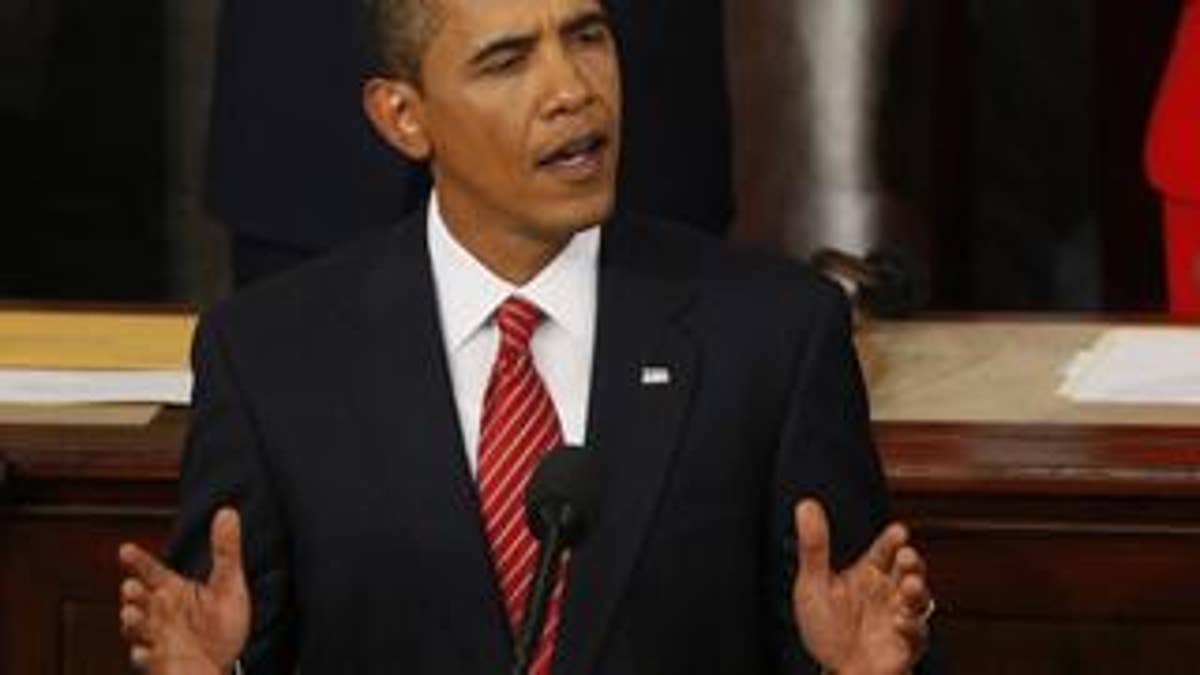
President Obama on Wednesday urged Congress to "meet history's test" and pass comprehensive health care reform, as he offered new guidance -- and concessions -- to lawmakers struggling to hammer out a deal.
In a sweeping and impassioned address, the president tried to issue the definitive outline of his vision for reform as well as convince skeptical lawmakers why they should support that vision. The rare address to a joint session of Congress came at a make-or-break time for health care reform, a reality Obama stressed.
"The time for bickering is over. The time for games has passed. Now is the season for action," Obama said. "Now is when we must bring the best ideas of both parties together ... Now is the time to deliver on health care."
He was often combative, telling die-hard opponents that he will not bother with them. But he was at times conciliatory, offering backing to a key GOP demand and showing wiggle room on what is arguably the most controversial element of reform -- a government-run health insurance plan.
Even as Obama re-stated his support for the so-called "public option," he urged liberal Democrats to consider alternatives.
"It's worth noting that a strong majority of Americans still favor a public insurance option of the sort I've proposed tonight. But its impact shouldn't be exaggerated -- by the left, the right, or the media. It is only one part of my plan, and shouldn't be used as a handy excuse for the usual Washington ideological battles," Obama said. "To my progressive friends, I would remind you that for decades, the driving idea behind reform has been to end insurance company abuses and make coverage available for those without it. The public option is only a means to that end -- and we should remain open to other ideas that accomplish our ultimate goal."
Obama said he would "not back down" on the principle that the government should provide an option for Americans who can't find affordable coverage. But he said proposals like nonprofit cooperatives or a mechanism that would keep a public option on reserve in areas where insurance companies are not providing affordable plans are "constructive ideas worth exploring."
The stance is sure to upset some liberal Democrats -- but it also continued to rankle Republicans who wanted Obama to take the option off the table completely.
"The president had a chance, tonight, to take the government-run health care off the table. Unfortunately, he didn't do it," Rep. Charles Boustany, R-La., said in the GOP response.
Boustany, a heart surgeon, said the public wanted Obama to tell Democratic leaders in Congress that, "it's time to start over on a common-sense, bipartisan plan focused on lowering the cost of health care while improving quality."
Obama sought middle ground elsewhere. Outlining what he said was a $900 billion plan, he also expressed potential support for some version of medical malpractice reform, something Republicans have long demanded.
In a passage that drew repeated applause, Obama said he's directed Health and Human Services Secretary Kathleen Sebelius to "move forward" on an initiative to start "demonstration projects" in certain states.
"I don't believe malpractice reform is a silver bullet, but I've talked to enough doctors to know that defensive medicine may be contributing to unnecessary costs," Obama said.
Obama also backed a health insurance mandate Wednesday, saying Americans should be required to get health insurance just as they are required to get auto insurance -- it was an idea he opposed during the presidential campaign.
"Improving our health care system only works if everybody does their part," the president said.
The president spoke a day after lawmakers returned from a rocky summer recess during which constituents flooded town hall meetings to voice their concerns about the bills on the table. Four partisan bills have passed out of committee in the House and Senate, and the only bill that has had bipartisan input is still stuck in the Senate Finance Committee.
In the face of public discontent, sagging poll numbers and stiff Republican opposition, Obama was trying to invigorate the push for reform -- even as he feels resistance from some members of his own party.
He offered personal stories of Americans who have suffered under the current system. He invoked the legacy of the late Sen. Ted Kennedy, who had made health care reform a life mission.
But he also used the address to very publicly rebuke those he claims are stonewalling the process for political reasons.
"We've seen Washington at its best and at its worst. We have seen many in this chamber work tirelessly for the better part of this year to offer thoughtful ideas about how to achieve reform," Obama said. "But what we have also seen in these last months is the same partisan spectacle that only hardens the disdain many Americans have toward their own government. Instead of honest debate, we've seen scare tactics. Some have dug into unyielding ideological camps that offer no hope of compromise."
He said to Republicans, "My door is always open," but assailed the "bogus claims" he says his critics have pushed.
"But know this -- I will not waste time with those who have made the calculation that it's better politics to kill this plan than to improve it. I won't stand by while the special interests use the same old tactics to keep things exactly the way they are," Obama said.
As he has before, Obama stressed the dire consequences of inaction, saying "more will die" if Congress does not act. He stressed his resolve to bring lawmakers together and clear away hurdles to passing an overhaul package.
"I am not the first president to take up this cause, but I am determined to be the last," Obama said.



